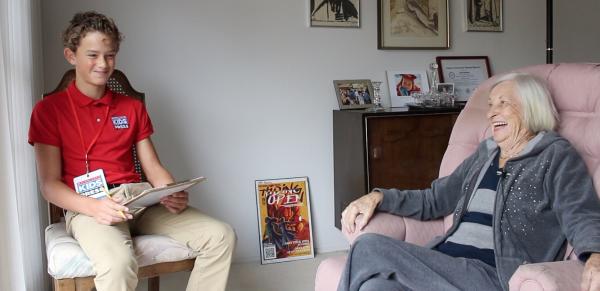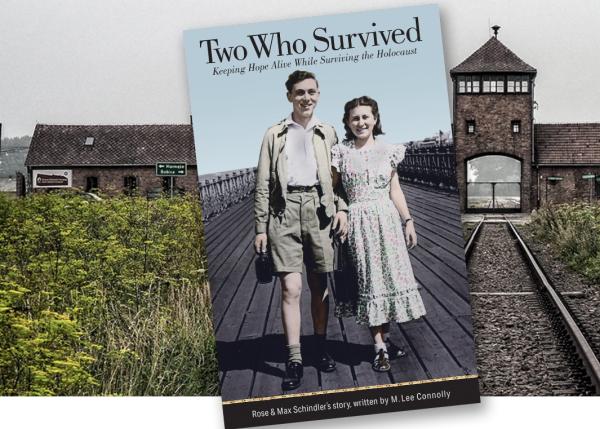KID REPORTERS’ NOTEBOOK
A Holocaust Survivor’s Story
January 27 is International Holocaust Remembrance Day. Established by the United Nations in 2005, the annual commemoration honors the six million people, most of them Jewish, who were killed in the Holocaust in the 20th century. They were victims of a systematic murder led by Nazi dictator Adolf Hitler.
From 1933 to 1945, Nazi Germany operated more than 1,000 concentration camps throughout Europe. The camps were liberated at the end of World War II (1941-1945) by soldiers from the United States, Russia, and other Allied countries. This year marks the 77th anniversary of the liberation of the Auschwitz-Birkenau camp in Poland.
I recently spoke with Rose Schindler, who survived Auschwitz and went on to share her story of tragedy and resilience. I first met Rose in 2020 in San Diego, California, where she and I both live. During a presentation for students, she described her experiences during the Holocaust.
“You have to have hope for anything and everything,” Holocaust survivor Rose Schindler told Quade during a recent interview at Rose’s home in San Diego, California.
“KNOW WHAT HAPPENED”
Rose was 14 years old in 1944, when she and her family were deported from their home in Czechoslovakia. They were sent by cattle cars to the Auschwitz-Birkenau camp in Poland. More than 1.1 million Jewish people and political prisoners were killed there.
Soon after arriving at the camp, Rose lied about her age in order to qualify for work. She later snuck into a selection line for a German factory with her two older sisters. She worked at the factory until Auschwitz was liberated by Russian soldiers in January 1945.
Rose emigrated to the United States with her husband, Max Schindler, in 1951. Max, who died in 2017, was also a Holocaust survivor who later educated young people about this horrific chapter in history. Their story is told in a book for young people by M. Lee Connolly. It’s called Two Who Survived, Keeping Hope Alive While Surviving the Holocaust.
Rose has received several honors for her service. Most notably, the San Diego County Board of Supervisors has proclaimed January 26 “Rose Schindler Day.” Here are highlights from my recent conversation with Rose, which has been lightly edited for length and clarity.
Why is sharing your experience as a Holocaust survivor important?
There are so many people who don’t know what happened to us during World War II. I’m doing this because it’s very important for the world to know what happened so that it won’t happen again.
What is your first memory of arriving at the camp?
I remember the whole thing, not just the first memory. We got there and were separated. All of the men in one line, children and parents in another line, and the women in the third line. The only people they saved were the women who could go to work. All the other people were taken to the gas chambers.
I was one of eight children. Three of us were over the age of 15. All of the others went straight into the gas chambers with my mother and grandparents.
You have a number tattooed on your left forearm. What was that for?
Most people who got numbers on their arms were sent to factories to work. The others had nothing. They never even took their names or anything. They just killed people. Thousands, every day, were sent into the gas chambers.
How were prisoners sent to work?
The only sign we saw when we came into the camp was Arbeit Macht Frei, a German phrase that means “work sets you free.” Nazi soldiers would come to the barracks and select people to go to the factories to work. The others were all taken away. A lot were taken to the gas chambers.
So, you’re saying that everyone was chosen for either work or immediate death? Why would the Nazis do that?
That was Hitler’s idea, to get rid of all the Jews. He was not a human being, let me tell you that much. He was afraid of the Jewish people because most of the Jewish people in Europe were very educated.

Quade enjoys a light moment with Rose.
Tell me about your father. What do you remember about the last time you saw him?
My father’s name was Solomon in Hungarian. In Yiddish, it was Shlomo Zalman. I saw my father once after we came to Auschwitz. My sisters and I were in a camp for old women. There were 30 barracks there, a thousand women in every barrack. My father and my brother were in the two barracks they used for the men, because they didn’t know where else to put them. We met the first morning we were in the camp. He was looking for us, and if I hadn’t gone out to walk, I probably would not have seen him. We were kind of lucky we met. If we hadn’t met, I probably wouldn’t be here.
What did your father tell you to do?
What made me survive was what my father said: “Stay alive so that you can tell the world what’s going on.” And that’s what made me stay alive. He said, “Don’t ever give up hope.” That’s what we had to live on. Those were his last few words to me and my two sisters. That’s what made me stay alive.
He gave you such a big mission. Do you think you fulfilled it?
I probably did. Absolutely! Absolutely!
What can we do to prevent things like the Holocaust from happening again?
You just have to be strong. Don’t give in to everything people tell you to do. And hopefully, this will never happen again.
I know you’re battling cancer, as you have before. What do you do when things get challenging?
You have to have hope for anything and everything. Without hope, you have nothing. If you have a bad day someday, remember that the next day will be better. Don’t ever give up hope. Remember that.

A book by M. Lee Connolly chronicles the story of Rose and her late husband, Max, who met after they survived the Holocaust.
